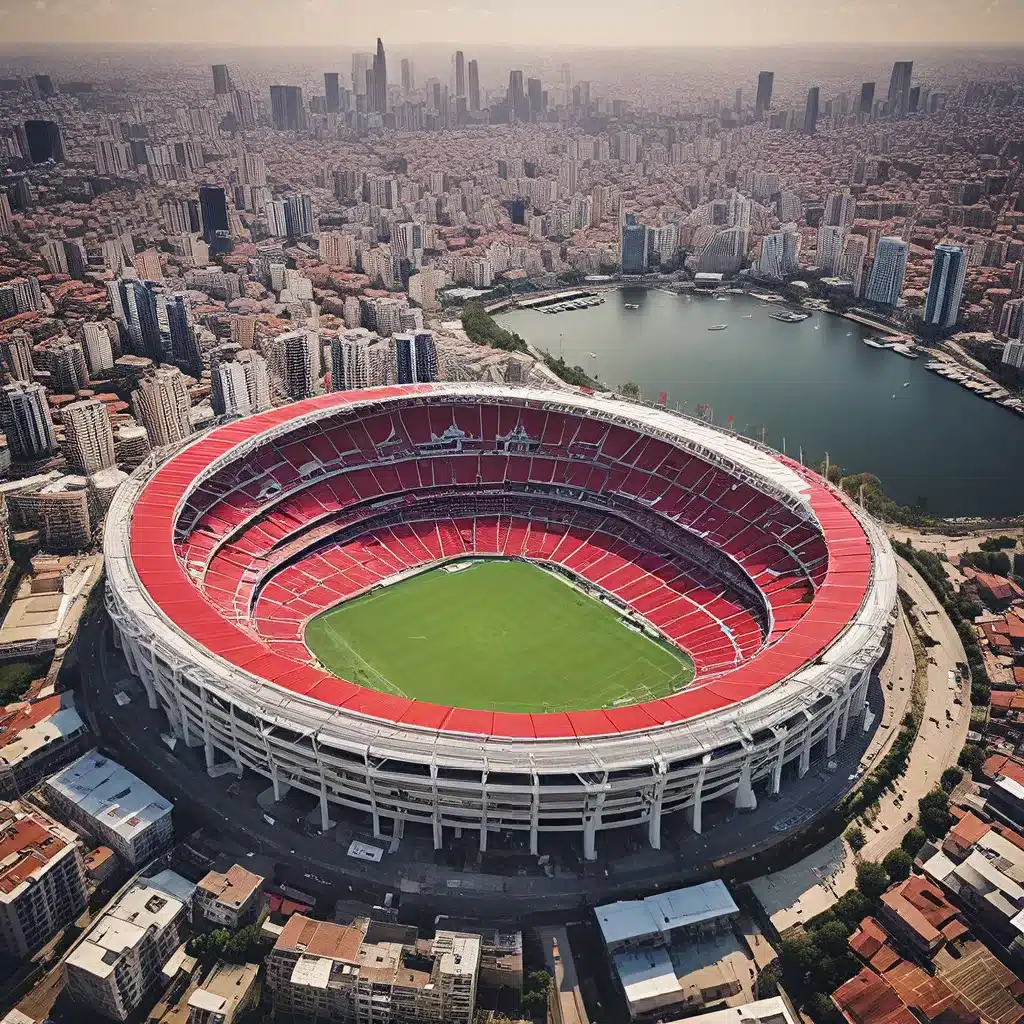
Nestled along the banks of the Guaíba River in the heart of Porto Alegre, Brazil, the Estadio Beira-Rio stands as a testament to the country’s rich footballing heritage. This iconic stadium, with its striking modernist architecture and panoramic views of the city skyline, has captivated the hearts of football enthusiasts and architecture aficionados alike.
A Brief History of the Estadio Beira-Rio
The Estadio Beira-Rio was initially constructed in 1969 to serve as the home ground for the local football club, Sport Club Internacional. Designed by renowned Brazilian architect José Teichmann, the stadium’s distinctive design was a departure from the traditional concrete and steel structures that dominated the era. Instead, the Estadio Beira-Rio features a bold, cantilevered roof and a facade adorned with intricate patterns and geometric shapes, creating a visually striking and modern aesthetic.
Over the years, the Estadio Beira-Rio has undergone several renovations and expansions to keep pace with evolving standards and accommodate the growing demands of modern football. In 2014, the stadium underwent a major overhaul in preparation for the 2014 FIFA World Cup, which was hosted in Brazil. During this renovation, the stadium’s capacity was increased to over 50,000, and numerous upgrades were made to the facilities, including the installation of a state-of-the-art lighting system and improvements to the spectator experience.
Architectural Marvels and Design Innovations
One of the most striking features of the Estadio Beira-Rio is its unique architectural design. The stadium’s cantilevered roof, which appears to float above the playing field, is a testament to the ingenuity of its designers. This innovative roof structure not only enhances the stadium’s visual appeal but also provides excellent coverage and protection for the spectators below.
Another notable aspect of the Estadio Beira-Rio’s design is the use of geometric patterns and shapes in the facade. These intricate designs, which are inspired by the indigenous cultures of Brazil, add a touch of cultural heritage and local identity to the stadium’s appearance. The result is a harmonious blend of modern architectural elements and traditional Brazilian aesthetics, creating a truly unique and captivating visual experience.
The Estadio Beira-Rio and the 2014 FIFA World Cup
The Estadio Beira-Rio played a significant role in the 2014 FIFA World Cup, which was hosted in several cities across Brazil. During the tournament, the stadium hosted a total of five matches, including a round-of-16 clash between France and Nigeria.
The renovations undertaken in preparation for the World Cup transformed the Estadio Beira-Rio into a state-of-the-art facility, capable of accommodating the demands of a global sporting event. The stadium’s improved infrastructure, enhanced seating capacity, and upgraded amenities provided an exceptional experience for players, officials, and spectators alike.
One of the most memorable moments of the 2014 World Cup at the Estadio Beira-Rio was the round-of-16 match between France and Nigeria. The match was a thrilling encounter, with France eventually emerging victorious by a score of 2-0. The roar of the crowd and the electric atmosphere inside the stadium only added to the excitement of the event, cementing the Estadio Beira-Rio’s reputation as a premier football venue.
The Estadio Beira-Rio Today
In the years since the 2014 World Cup, the Estadio Beira-Rio has continued to be a hub of activity and a source of pride for the people of Porto Alegre. The stadium remains the home ground of Sport Club Internacional, and it regularly hosts matches for the Campeonato Gaúcho, the top-level state championship in Rio Grande do Sul.
Aside from its role as a football stadium, the Estadio Beira-Rio has also become a popular destination for visitors to the city. The stadium’s stunning architectural features and panoramic views of the Guaíba River and the Porto Alegre skyline have made it a must-see attraction for tourists and architecture enthusiasts alike.
In recent years, the Estadio Beira-Rio has also played host to a variety of other events, including concerts, festivals, and community gatherings. This multi-purpose functionality has further cemented the stadium’s status as a hub of cultural and social activity in Porto Alegre, reinforcing its position as a beloved landmark and a source of civic pride.
Exploring the Estadio Beira-Rio’s Surroundings
The Estadio Beira-Rio is not just a standalone landmark; it is part of a larger urban landscape that offers a wealth of cultural and recreational experiences for visitors. The stadium’s location along the Guaíba River provides easy access to a range of outdoor activities, including walking, jogging, and cycling along the scenic riverfront promenade.
Nearby, the Parque Marinha do Brasil, a sprawling green space, offers visitors the opportunity to explore lush gardens, picnic areas, and recreational facilities. The park’s tranquil atmosphere and stunning views of the river and the city skyline make it a popular destination for locals and tourists alike.
Just a short distance from the Estadio Beira-Rio, visitors can also discover the vibrant Cidade Baixa neighborhood, known for its eclectic mix of restaurants, bars, and cultural institutions. This lively district is a hub of the city’s nightlife and cultural scene, providing a unique and immersive experience for those exploring the area around the stadium.
Conclusion: Celebrating the Estadio Beira-Rio’s Architectural and Cultural Significance
The Estadio Beira-Rio is a true gem in the crown of Brazilian football and architecture. Its striking modernist design, combined with its rich history and cultural significance, has made it a beloved landmark in Porto Alegre and a must-visit destination for anyone exploring the country.
As the home of the revered Sport Club Internacional, the Estadio Beira-Rio continues to be a source of pride and passion for the local community. Its role as a multi-purpose venue, hosting everything from football matches to cultural events, has cemented its place as a central hub of activity and a symbol of the city’s vibrant spirit.
For those interested in discovering the architectural marvels and cultural treasures of Brazil, a visit to the Estadio Beira-Rio is an absolute must. Its breathtaking skyline, innovative design, and immersive surroundings offer a truly unforgettable experience that celebrates the country’s rich heritage and enduring passion for the beautiful game.

